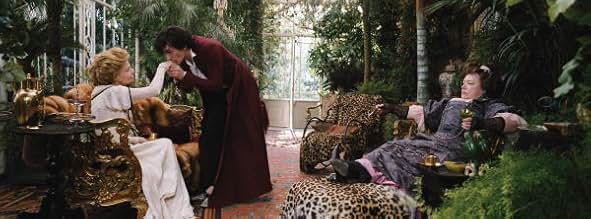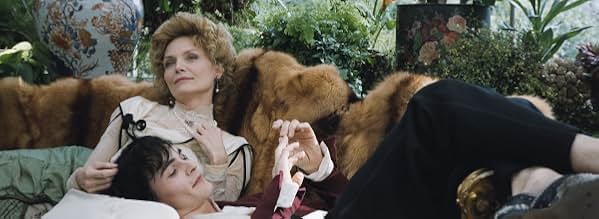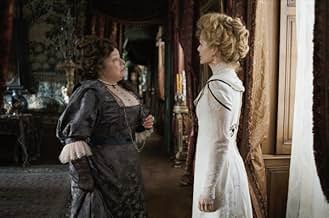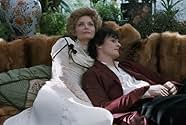Le fils d'une courtisane se retire dans un monde fantastique après avoir été contraint de mettre fin à sa relation avec une femme plus âgée qui l'avait éduqué aux choses de l'amour.Le fils d'une courtisane se retire dans un monde fantastique après avoir été contraint de mettre fin à sa relation avec une femme plus âgée qui l'avait éduqué aux choses de l'amour.Le fils d'une courtisane se retire dans un monde fantastique après avoir été contraint de mettre fin à sa relation avec une femme plus âgée qui l'avait éduqué aux choses de l'amour.
- Director
- Writers
- Stars
- Prix
- 3 victoires et 2 nominations au total
Avis en vedette
The story is simple: courtesans in Paris must eventually retire form their lives of becoming wealthy through pleasing men of the higher class, and either they live out their lives in the luxuries of fluff or they must confront their aging and feel pangs of remorse as they end their lives alone, without a man to bolster them. Lea de Lonval (Michelle Pfeiffer) has been longtime 'friends' with Madame Peloux (Kathy Bates), even to the point of nurturing Madame's son Chéri (Rupert Friend) as he approaches manhood. Madame asks Lea to 'polish' Chéri for other women and after what might have been a brief fling in Normandy, the young Chéri and the aging Lea fall into a six year relationship. But as Madame realizes she needs grandchildren, she eventually finds a proper girl Edmee (Felicity Jones) for Chéri to marry. The remainder of the story is how these two age-disparate characters adapt to the 'social rules' of La Belle Epoque, suggesting that even under extraordinary circumstances the power of love is an issue that must be confronted.
Despite the performances by Pfeiffer and Friend (and even the miscast Bates) the story feels somehow sterile. Perhaps it is the out of place use of a male narrator who gives the film an unnecessary feeling of being a documentary, or the somewhat overused musical score of Alexandre Desplat, or the emphasis on costumes that hardly add to the beauty of Pfeiffer as Lea that keep the production grounded. It is a pleasant enough film, but hardly a memorable one. Grady Harp
Colette's two novels about Chéri (Friend) the son of wealthy courtesan Madame Peloux (Kathy Bates), are not just about an indolent but beautiful rich slacker; they also follow the good fortune of Lea de Lonval (Pfeiffer), an unusually beautiful and profitable courtesan who has shrewdly prepared herself for financial comfort but forget the cardinal rule of prostitutes: Don't fall in love.
After six years of lover's paradise, Chéri and Lea part as the takes an arranged bride. And that's all there is, folks, as the film moves from a robust ramble about the various courtesans to a dreary hour of Twilight-like longing between this old-fashioned Harold and Maude. Director Steven Frears, who has had a fair share of intriguing films and characters, just lets the camera make love to Pfeiffer and Friend without fleshing out the characters to let is know what is so lovable to be longing for so long. Writer Christopher Hampton with Dangerous Liaisons and Atonement on his resume can't seem to muster a memorable line or develop his characters from flat clichés into round characters.
I do concede that Kathy Bates delivering this line saved the film for the moment: "Don't you find that when the skin is a little less firm, it holds perfume so much better?" Said to Michelle Pfeiffer, these lines give Bates bite of the year honors and a brief respite from spare, meaningless dialogue.
The script is pretty nondescript in places. Pfeiffer has a few decent lines and still radiates enough screen presence to carry some scenes, and Bates matches her well. Most of the problems with this film are based on the male character Cheri (Friend). He is left with too little too late for us to care about his fate. lnstead he allows himself to have his opinions formed for him by his mother and and Lea who also does much of what passes for thinking on his behalf as well. He is married off to a woman he doesn't love, and then proceeds to drift between her and his lover without ever showing any real sense of commitment to either.
Due to the limitations of the script and his character, he comes across as only half formed, and too many scenes end with him staring blankly into the camera, looking quite vacuous, and a penny for his thoughts would be an understatement of inflation. lt is not easy to know which audience this movie is aimed at. It is not quite glamorous enough to be mainstream nor is it memorable enough to be art-house. As a result it meanders along without ever really being anything more than an exercise in self indulgence. That is a pity as l was expecting a fair bit more from those involved.
Le saviez-vous
- AnecdotesWhen the project was in development during the 1990s, Jessica Lange planned to star as Léa de Lonval.
- GaffesIn the closing credits, 'thanks' are given to France's national railway, the Societe National Chemin de Fer, known as the "SNCF". However the credits have the letters out of sequence, calling it the "SCNF".
- Citations
Lea de Lonval: You came back here and you found an old woman. Yes, you found an old woman. Don't cry. Why are you crying? I'm so grateful to you. Were you really in love with me? Did you really think I was such a good person? If I had been a truly good person, I'd have made a man of you instead of thinking of nothing but your pleasure and my happiness. I wouldn't have kept you all to myself. Look at me. You're right. The qualities you lack, I expect it is my fault. But 30 years of easy living does make you very vulnerable. So no, I never did talk to you about the future. Forgive me. I loved you as if we were going to die the same day. I carried you in my heart for such a long time. I forgot you were going to have to carry your own burdens. A young wife. Perhaps even a child. And so you're going to suffer. You're going to miss me. And you're going to have to try to find enough wisdom and tolerance not to cause suffering to others. The thing is, now you've had a taste of youth. It's never satisfying, but you'll always want to go back for more. You must go. I love you. But it's too late. So get dressed. And go away now.
- Autres versionsThere are five different versions. Runtimes are: "1h 40m(100 min), 1h 26m(86 min) (United States), 1h 32m(92 min) (United States), 1h 32m(92 min) (Argentina), 1h 40m(100 min) (Berlin International) (Germany)".
Meilleurs choix
- How long is Chéri?Propulsé par Alexa
- Is "Chéri" based on a book?
Détails
Box-office
- Budget
- 23 000 000 $ US (estimation)
- Brut – États-Unis et Canada
- 2 715 657 $ US
- Fin de semaine d'ouverture – États-Unis et Canada
- 405 701 $ US
- 28 juin 2009
- Brut – à l'échelle mondiale
- 9 368 242 $ US
- Durée1 heure 40 minutes
- Couleur
- Mixage
- Rapport de forme
- 2.35 : 1
Contribuer à cette page


































